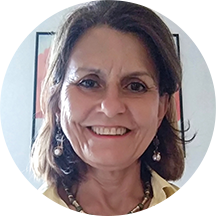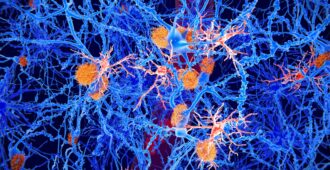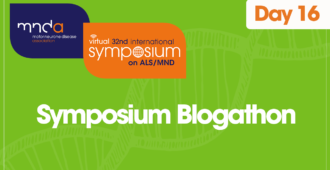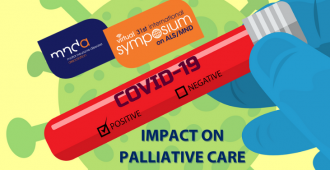This is the last in a series of three blog articles from Session 7 – Perspectives: Lessons from COVID-19 in which we heard from different speakers about how the COVID-19 pandemic has impacted their own experiences of clinical trials, research, and support within the MND community. A further blog, written by Bruce Virgo who is living with MND and who also presented during this session, will be published shortly.
Although the impact of the COVID-19 pandemic has been great, the lessons learnt have been greater and, moving forward, short-term solutions to immediate problems are evolving into long-term strategies for continuing and improving research into MND, re-evaluation of clinical trial design and providing more effective and relevant care for people affected by the disease.

The third speaker in this session was Dr Caterine Bendotti from the Mario Negri Institute for Pharmacological Research in Milan, where the first outbreak of COVID-19 was recorded in Italy in February 2020. Dr Bendotti spoke about the ‘Impact on basic and translational science’. Translational science is the process of turning observations in the lab, clinic and community into interventions that improve the health of individuals and populations.
How did the pandemic affect research work?
The announcement by the Italian government that everyone had to change to smart working caused worry for the students working in Dr Bendotti’s lab – would they be able to graduate as they were unable to continue their work?
Although they were unable to go into the lab for several months, they turned this into an opportunity to take more time with data analysis, to discuss new ideas, insights and hypotheses for future projects via virtual groups, and concentrate on writing papers.
Does the research on COVID have implications for ALS research?
There is growing evidence that immunity and inflammation play an important role in the development and progression of ALS, in both people living with disease and animal models, and Dr Bendotti’s lab has been looking at this for some time.
They had already identified some factors that are important for inflammation in an animal model of ALS – the P2X7 receptor and Cyclophilin A – and both of these have recently been identified as potential targets for the treatment of COVID-19.
Researchers could benefit from collaborating with COVID-19 researchers to understand better the pathways related to these mechanisms, as well as with companies interested in the development of drugs related to COVID that could be translated into treatments for ALS.
Can we learn from the rapid distribution of COVID-19 data to speed up progress in ALS research?
Another aspect that has strongly emerged from the COVID pandemic is the huge and rapid sharing of data from the scientific community. Scientists have begun to publish papers very quickly, with new information being available within days rather than months because the work is not peer-reviewed prior to publication. Peer review is usually carried out by several reviewers before the article is published, but this is now happening after publication through a mechanism of open peer review. Although this does make information available much faster, and with free access, it does give rise to concerns about the reliability and quality of these studies, and this is especially important when they are reported on by the media.
Has the COVID pandemic affected funding for ALS research?
Some funding has been diverted to the COVID emergency and this will likely continue until vaccines are available for all.
However, there are positives to be taken from how COVID has impacted funding to the research and scientific community. COVID has helped to increase awareness of scientific research which can promote local and European lobbying to support investments in biomedical research. It has provided opportunity for greater communication to the public to create awareness of the need for resources, and it has increased scientific collaboration through the sharing of knowledge and resources.
Due to the amazing work carried out by our Fundraising team and the generosity of our supporters during this difficult time, MND Association funded researchers have not been affected and we extend our heartfelt thanks to everyone involved.
Although the COVID pandemic has, in many labs, delayed experiments and led to the reallocation of funding away from ALS, it has also given rise to opportunities for new ideas and insights to take shape, new working methods to be initiated, more collaboration, speedier sharing of work and more interest in biomedical research.
“In the midst of every crisis, lies great opportunity.”
Albert Einstein





